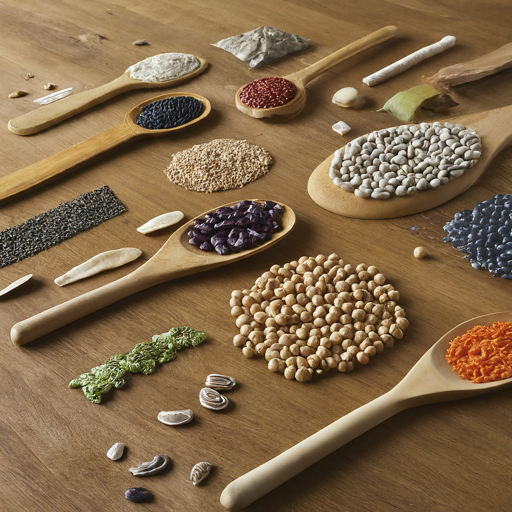A Comprehensive Guide to Growing Healthy Plants with Vegetable Seeds

Growing your own vegetables from vegetable seeds is an exciting and rewarding experience. Whether you are a seasoned gardener or just starting, understanding how to choose, plant, and care for your seeds is the first step toward a thriving garden. In this article, we’ll explore how you can cultivate a variety of vegetables right from the seed, along with some handy tips and alternative seed varieties to consider.
What Are Vegetable Seeds?
Vegetable seeds are the small plant embryos that grow into edible plants, including everything from leafy greens to root vegetables. They come in many forms—heirloom, organic, hybrid—and each type of seed has its own unique benefits and growing requirements. The variety of seeds you choose will affect the flavor, growth rate, and hardiness of your crops.
Choosing the Right Seeds for Your Garden
Before you start planting, selecting the right garden seeds is essential. The types of seeds you choose will depend on your climate, the time of year, and the space available for gardening. Here are a few factors to consider:
-
Heirloom Seeds: These seeds are passed down through generations and are known for their rich flavor and genetic diversity.
-
Organic Seeds: These are grown without the use of synthetic chemicals, making them a great choice for eco-conscious gardeners.
-
Hybrid Seeds: Hybrid seeds are bred to improve certain traits, such as disease resistance or higher yields, making them an excellent choice for beginner gardeners.
Once you have an idea of the type of seeds you want, it’s time to consider the variety of vegetables you wish to grow. Common options include tomatoes, cucumbers, lettuce, carrots, and beans.
How to Plant Vegetable Seeds
Now that you have your vegetable seeds ready, the next step is planting them properly. Planting seeds may seem simple, but a few key tips will help you maximize your success.
-
Prepare the Soil: A nutrient-rich, well-draining soil is essential for strong growth. Mix in compost or organic matter to provide a healthy environment for your seeds.
-
Plant at the Right Depth: The depth at which you plant your seeds varies depending on the vegetable. Larger seeds, like beans, should be planted deeper (about 1 inch), while smaller seeds, like lettuce, only need to be lightly covered with soil.
-
Watering: Keep the soil moist but not soaked. Overwatering can cause seeds to rot, while underwatering may prevent germination.
-
Label Your Rows: It’s easy to forget what you planted, so labeling your rows with seed names and dates will help you stay organized.
-
Spacing: Proper spacing allows plants to grow without competing for sunlight, water, and nutrients. Always follow the seed packet’s recommendations for optimal spacing.
Caring for Your Growing Vegetables
Once your seeds sprout, they will need ongoing care to ensure a bountiful harvest. Here are some crucial steps to follow as your plants grow from seeds into fully grown vegetables.
-
Sunlight: Ensure your vegetable seedlings get plenty of sunlight. Most vegetables need at least 6 hours of direct sunlight each day.
-
Watering Routine: Water your plants regularly, but be careful not to overwater. As plants grow, their water needs will increase.
-
Fertilization: As your plants mature, you can give them a boost with organic fertilizers. This will help them produce more fruits or vegetables.
-
Weeding: Keep an eye on weeds, as they compete for nutrients and can stifle your plants' growth.
Common Vegetable Seed Varieties to Try
There is a wide variety of vegetable seeds you can grow, each with its own set of characteristics. If you’re unsure of where to start, here are some popular options for beginner gardeners:
-
Tomato Seeds: Available in many varieties, from cherry tomatoes to beefsteaks, they are a staple in many gardens.
-
Cucumber Seeds: Easy to grow and perfect for salads or pickling, cucumbers thrive in warm weather.
-
Lettuce Seeds: A fast-growing option that can be harvested in as little as 30 days, making it ideal for those looking for quick results.
-
Carrot Seeds: These root vegetables are a great choice for cooler climates and can be stored for long periods.
-
Bean Seeds: Beans are versatile and come in both bush and pole varieties. They’re also nitrogen-fixing plants, improving soil health.
Where to Buy Vegetable Seeds
If you’re looking to purchase vegetable seeds for your garden, you can find them at a variety of retailers:
-
Seed Catalogs: Many seed companies offer catalogs that allow you to browse a wide selection of seeds from the comfort of your home.
-
Online Stores: Online platforms such as seed specialty websites and large retailers provide access to a vast array of seed varieties.
-
Local Garden Centers: Visiting a local nursery or garden center allows you to speak directly with experts and see seed options up close.
Conclusion
Starting your garden with vegetable seeds offers numerous benefits, from the satisfaction of growing your own food to the joy of nurturing plants from the very beginning. With the right seeds, proper planting, and consistent care, you can enjoy a bountiful harvest of fresh, homegrown vegetables all season long.
Happy gardening!
- Art
- Causes
- Crafts
- Dance
- Drinks
- Film
- Fitness
- Food
- الألعاب
- Gardening
- Health
- الرئيسية
- Literature
- Music
- Networking
- أخرى
- Party
- Religion
- Shopping
- Sports
- Theater
- Wellness
- IT, Cloud, Software and Technology


